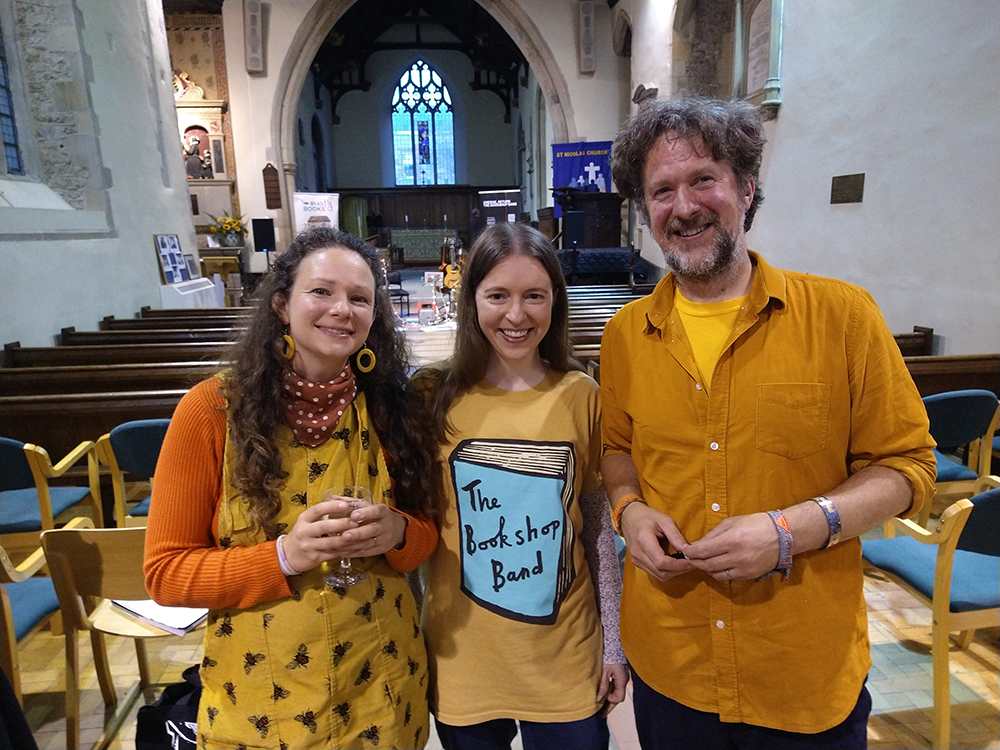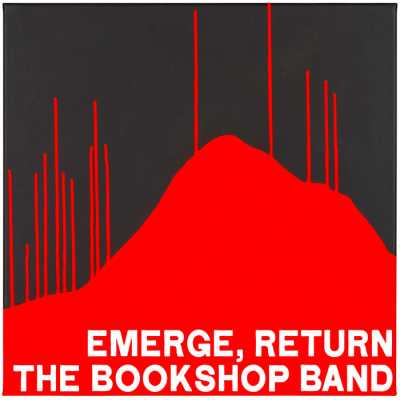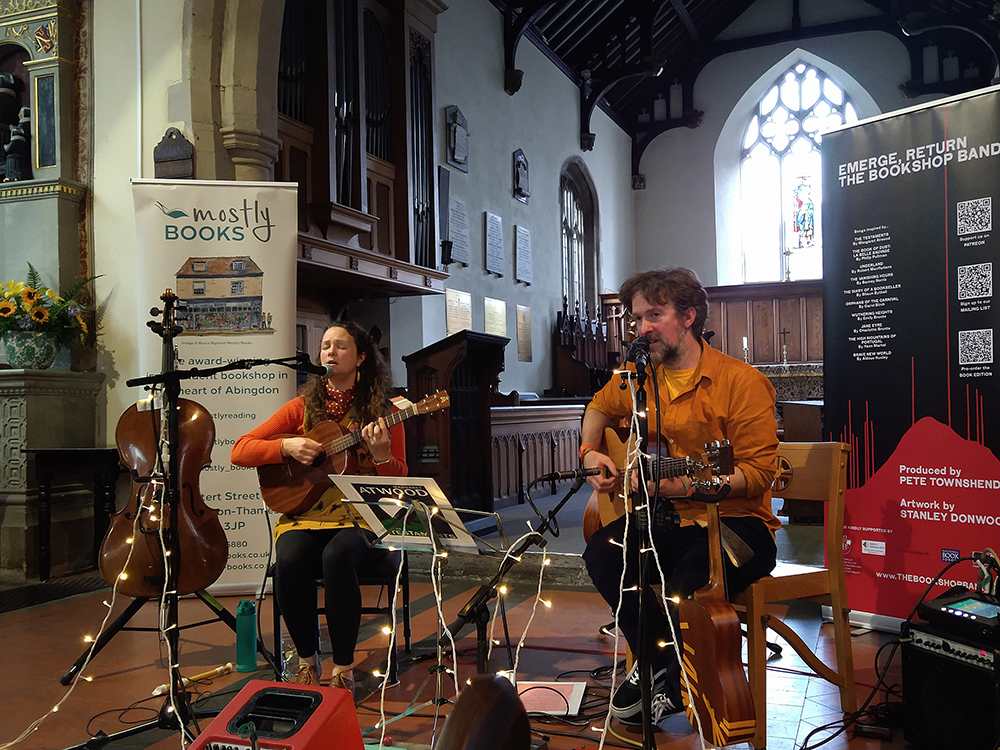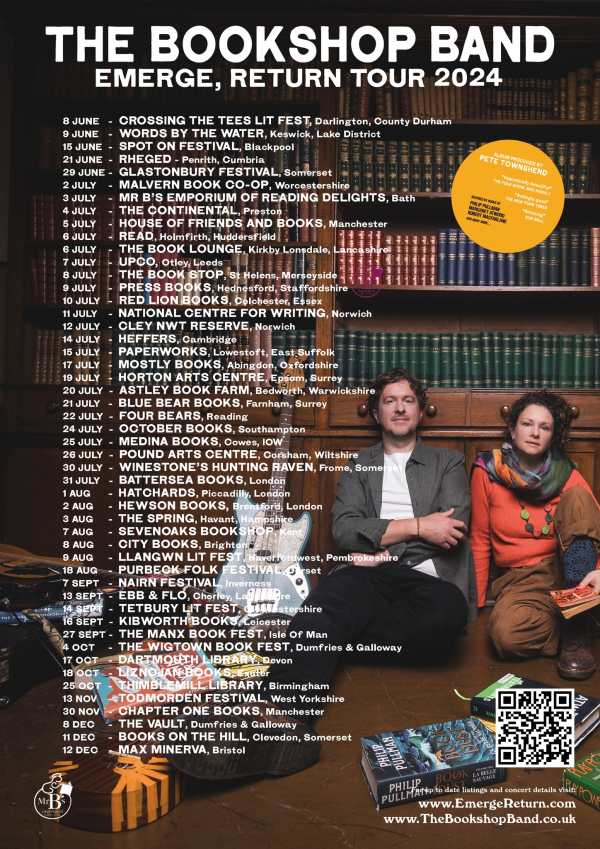The Bookshop Band Goes on Tour with Emerge, Return

By Rebecca Foster
On the ground in the UK, one of Foreword’s most talented and polymathic writers, Rebecca Foster, reached out recently to rave about her favorite band. Cool, we thought, but we’re a magazine about books, why should we care? She was three steps ahead of us, as usual. Check out this report from the live performance of The Bookshop Band’s latest album, as well as a review of their latest album release.
The Bookshop Band has a unique selling point: All their songs are based on books, and they typically play them in independent bookstores and libraries. Husband-and-wife duo Ben Please and Beth Porter started off in a house band at Mr B’s Emporium of Reading Delights in Bath, England, writing and performing book-related songs for author events. For more than a decade they have been one of Britain’s hidden musical gems; they only toured the USA once in 2019, when they also played at Winter Institute in Albuquerque and recorded a Live in American Bookshops album. But this may be the year that well-deserved fame finally catches up with them, thanks to Pete Townshend.

The band’s collaboration with the legendary guitarist for The Who is due to a chance meeting that took place via a mutual acquaintance from the British folk music scene. Townshend ended up producing Emerge, Return in his home studio. His influence may be most audible in the baritone backing vocals and synths, but he’s contributed to the instrumentation throughout, creating an overall higher-budget feel than in their 13 previous studio albums.
But the Bookshop Band essence is still there: intricately crafted songs and multi-part harmonies, with stringed instruments providing much of the rhythm. The tone is somewhat darker, however. The band lists “the oppression of bodies, free will and free speech” as being among the recurring themes. Secrecy versus venturing out despite fear is another common topic, and “hiding” is a repeated word that meets its riposte in the title phrase (from “Deep Time,” about the subterranean expeditions in Robert Macfarlane’s Underland).
In the first four tracks, minor chords create a somber, even eerie ambiance that suits the subject matter. In “Eve in Your Garden,” inspired by Margaret Atwood’s The Testaments, the simple ukulele strumming under lines like “Worship God and shed the blood” is aptly sinister. “Sanctuary” and “Room for Three,” both written for the 2016 launch of Philip Pullman’s La Belle Sauvage, depict beleaguered parents seeking refuge for baby Lyra in a menacing world. Anxieties around parenthood fuel a couple of later songs, too.
“Dirty Word,” created around Aldous Huxley’s Brave New World, arose from a 2018 commission to write about the V&A Museum’s archival materials related to banned books. Its percussive guitar hook contrasts with the ethereal wordplay of the chorus: “You can have a soma holiday / And travel to the moon / Slipping out of time / And tripping all afternoon.”
“Faith in Weather” retells a Central European folktale about a woman sworn to silence until her love returns. It’s one of the best instances of the interplay of Porter’s cello bass line and Please’s guitar melody. The two alternate lead vocals throughout the album, but the final a cappella chorus here is a fine example of how their voices harmonize.
Two songs are based on Orphans of the Carnival, Carol Birch’s novel about real-life 1850s Mexican circus “freak” Julia Pastrana. Her exploitation and sense of isolation while touring come through clearly in “Waggons and Wheels.” “Doll” hints at the secondary storyline about an odd doll that connects Julia with a woman in London in the near present. “Why I Travel This Way,” which draws on Yann Martel’s The High Mountains of Portugal, shares the motif of journeying. The beauty of a Bookshop Band song, perhaps clearest in this trio, is that one needn’t have any familiarity with the book in question. Lyrics might engage with the particulars of a story by zeroing in on a certain scene or taking on the persona of a character, but what comes across more strongly is a general atmosphere or emotion.
“The Night We Came to Wigtown,” the most upbeat number, is a cheeky rejoinder to the first of Shaun Bythell’s diaries (later works include Confessions of a Bookseller and its sequel) – Bythell and the Bookshop Band are among the minor celebrities resident in Wigtown, the book town of Scotland, and are heavily involved in its cultural life. Bythell’s 2014 diary entry about the band’s first visit to the town omits certain things that happened after the hung-over shop owner went to bed, they insist: “our entry is too short and we think that we ought to explain to everyone what really went on while Shaun was asleep and snoring. … Now we’ve moved to Wigtown, so now we can expose him.”
The conclusion has a mellow, moody note, with “The Pull of the Moors” evoking Jane Eyre and Wuthering Heights and “The Vanishing Hours” responding to the novel by Barney Norris—a name that may be new to North American readers. Hand claps set a tricky time signature and the riff is accented by electric guitar stabs, reminiscent of Radiohead (and the Emerge, Return cover art is by Stanley Donwood, who does all of Radiohead’s album design). All told, it’s a stylistically varied album where every song suits the book to which it pays tribute.

The Bookshop Band has been among my favorite acts since I first saw them play in 2014. I have also helped to crowdfund their projects as a Patreon supporter. They’re currently on a 50-date summer/fall tour of Britain in support of Emerge, Return. It was my sixth time seeing them in concert and I’m convinced they just keep getting better. I got tickets for the July 17th show, held at St Nicolas’ Church in Abingdon, Oxfordshire but hosted by the town’s indie bookstore, Mostly Books. There in the front pew with my limited-edition band T-shirt on, I was competing for the accolade of biggest fan. I also had the chance to meet up with a blogging friend for the occasion; though new to their music, she went away a confirmed fan.
Concertgoers were treated to seven numbers from the new album plus six old favorites, including “We Are the Foxes” (inspired by Glow by Ned Beauman), “Bobo and the Cattle” (inspired by Don’t Let’s Go to the Dogs Tonight by Alexandra Fuller), and “Once Upon a Time” (a compilation of literary first lines), and two songs from side projects. The band gave not just information about the motivation behind songs, but insight into what was happening in their lives as they wrote – and how they have sometimes come to rethink the material over the years. For instance, Porter mentioned that she’d studied The Handmaid’s Tale in high school but that revisiting it as an adult prior to reading the sequel was harrowing–a reflection of how the world had changed but also of how alert she now is to threats as a mother.

There’s a touch of the serendipitous to so much about the band: how they formed, which books they’ve ended up writing about, and how they lucked into big-name production for this latest album. They are mega-talented but unassuming individuals, and any book lover will find many gems among their huge back catalogue. If you’re curious but can’t make it to one of their shows, you’re in luck – their complete works are available on Bandcamp and Spotify, and they have lots of music videos on YouTube, too.
Rebecca Foster
